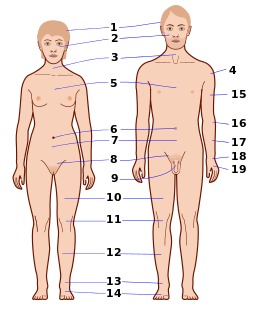skeleton
English
Pronunciation
- IPA(key): /ˈskɛlətən/
audio (GA) (file)
Etymology 1
| Picture dictionary | ||
|---|---|---|
| ||
|
From New Latin sceleton, from Ancient Greek σκελετός (skeletós, “dried up, withered, dried body, parched, mummy”), from σκέλλω (skéllō, “dry, dry up, make dry, parch”), from Proto-Indo-European *(s)kelh₁- (“to parch, wither”); compare Greek σκληρός (sklirós, “hard”).
Alternative forms
- sceleton (obsolete)
Noun
skeleton (plural skeletons or skeleta)
- (anatomy) The system that provides support to an organism, internal and made up of bones and cartilage in vertebrates, external in some other animals.
- 1881–1882, Robert Louis Stevenson, “The Treasure Hunt—Flint’s Pointer”, in Treasure Island, London; Paris: Cassell & Company, Limited, published 14 November 1883, OCLC 702939134, part VI (Captain Silver), page 263:
- At the foot of a pretty big pine, and involved in a green creeper, which had even partly lifted some of the smaller bones, a human skeleton lay, with a few shreds of clothing, on the ground.
-
- An anthropomorphic representation of a skeleton.
- She dressed up as a skeleton for Halloween.
- 1724, Charles Johnson, “Of Captain Spriggs and His Crew”, in A General History of the Pyrates, […], 2nd edition, London: Printed for, and sold by T. Warner, […], OCLC 2276353, pages 411–412:
- A Day or two after they parted, [Francis] Spriggs was choſe Captain by the reſt, and a black Enſign was made, which they called Jolly Roger, with the ſame Device that Captain [Edward] Low carried, viz. a white Skeliton in the Middle of it, with a Dart in one Hand ſtriking a bleeding Heart, and in the other, an Hour Glaſs; when this was finiſhed and hoiſted, they fired all their Guns to ſalute their Captain and themſelves, and then looked out for Prey.
- (figuratively) A very thin person.
- She lost so much weight while she was ill that she became a skeleton.
- (figuratively) The central core of something that gives shape to the entire structure.
- The skeleton of the organisation is essentially the same as it was ten years ago, but many new faces have come and gone.
- (architecture) A frame that provides support to a building or other construction.
- (computing) A client-helper procedure that communicates with a stub.
- In remote method invocation, the client helper is a ‘stub’ and the service helper is a ‘skeleton’.
- (geometry) The vertices and edges of a polyhedron, taken collectively.
- (printing) A very thin form of light-faced type.
Synonyms
- (anatomy): ottomy (obsolete), skellington (nonstandard)
- (very thin person): see also Thesaurus:thin person
- (central core giving shape to something): backbone
Antonyms
- (computing): stub
Derived terms
Related terms
- endoskeleton
- exoskeleton
- hydrostatic skeleton
- skeleton bill
- skeleton crew
- skeleton in the closet, skeleton in the cupboard
- skeleton key
- skeleton leaf
- skeleton proof
- skeleton regiment
- skeleton shrimp
- skeleton staff
- skeleton suit
Translations
system that provides support to an organism
|
|
very thin person
frame that provides support to a building
|
computing: client-helper procedure
- The translations below need to be checked and inserted above into the appropriate translation tables, removing any numbers. Numbers do not necessarily match those in definitions. See instructions at Wiktionary:Entry layout#Translations.
Verb
skeleton (third-person singular simple present skeletons, present participle skeletoning, simple past and past participle skeletoned)
- (archaic) to reduce to a skeleton; to skin; to skeletonize
- (archaic) to minimize
See also
Etymology 2
The etymology of the term is disputed between two versions.[1]
Noun
skeleton (uncountable)
- (sports, uncountable) A type of tobogganing in which competitors lie face down, and descend head first (compare luge).
Synonyms
- (type of tobogganing): skeleton tobogganing
Translations
type of tobogganing
|
See also
References
- IBSF (International Bobsleigh & Skeleton Federation), "Skeleton history" (2015)
Esperanto
French
Pronunciation
- IPA(key): /ske.le.tɔ̃/
This article is issued from
Wiktionary.
The text is licensed under Creative
Commons - Attribution - Sharealike.
Additional terms may apply for the media files.


